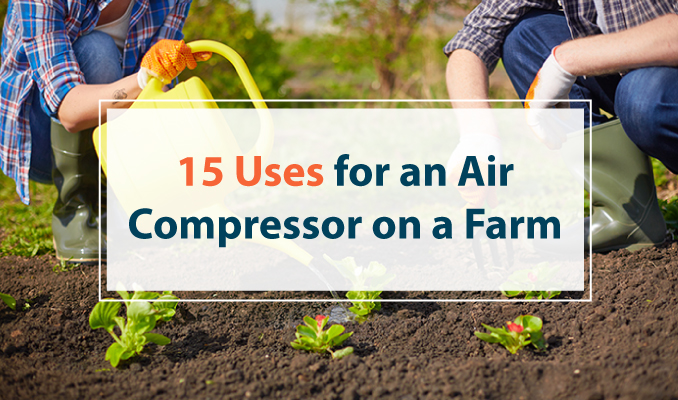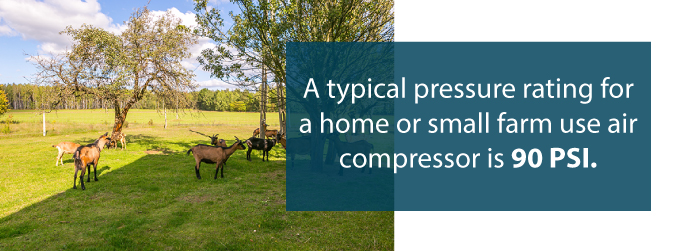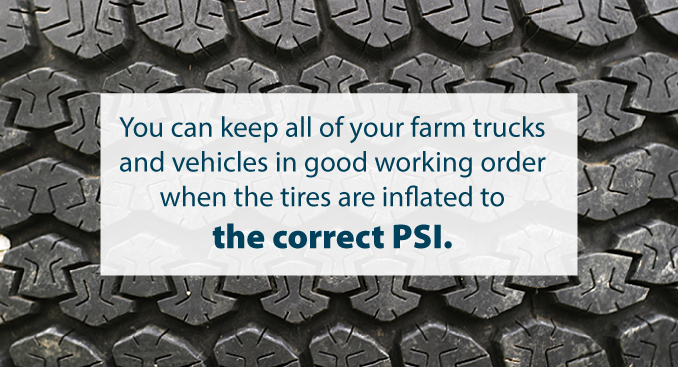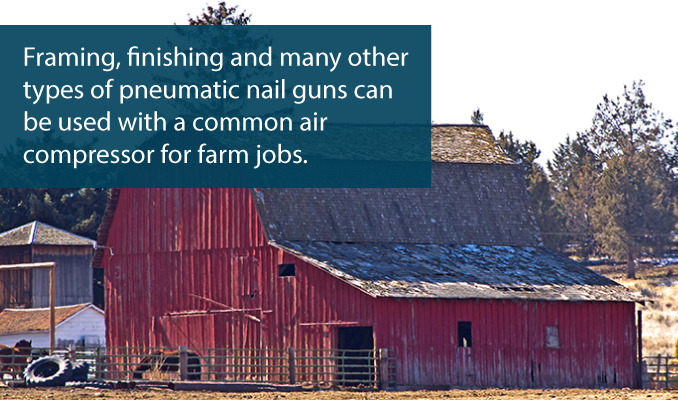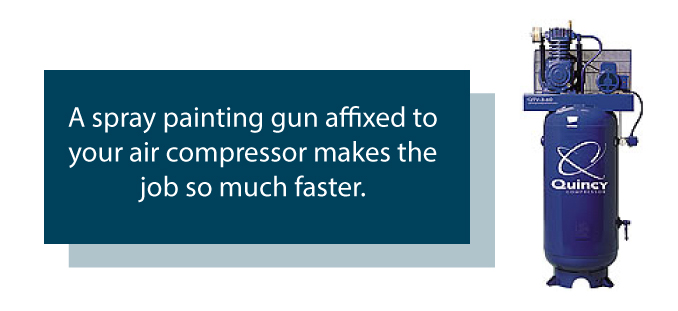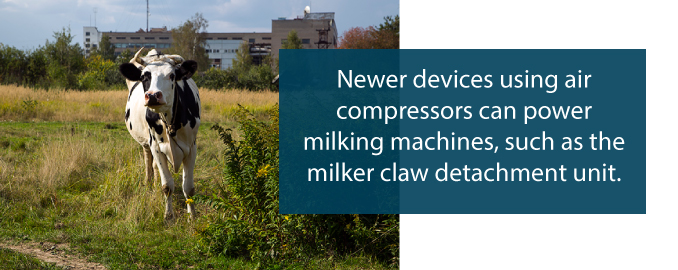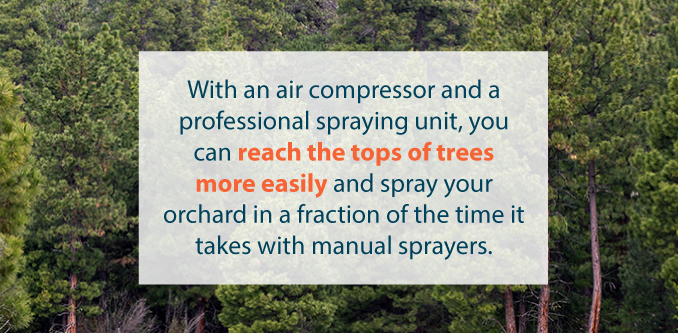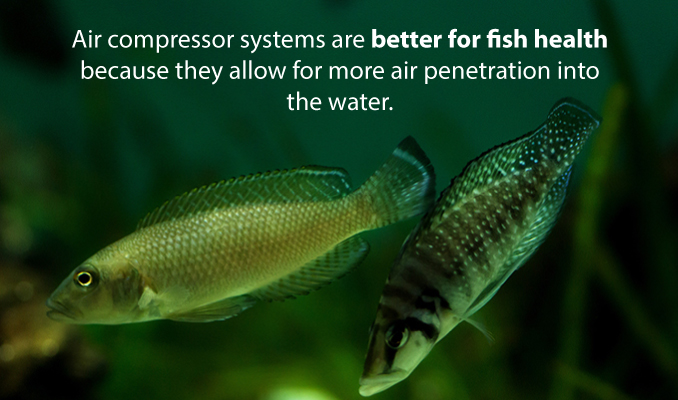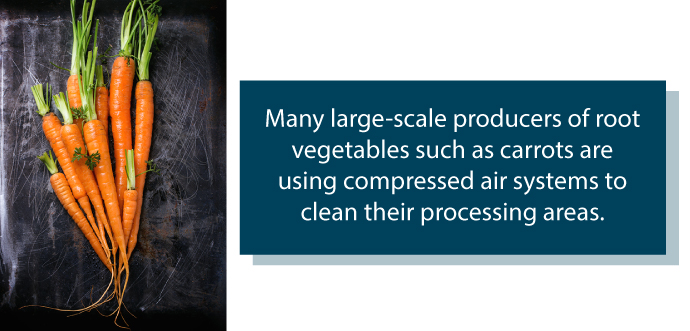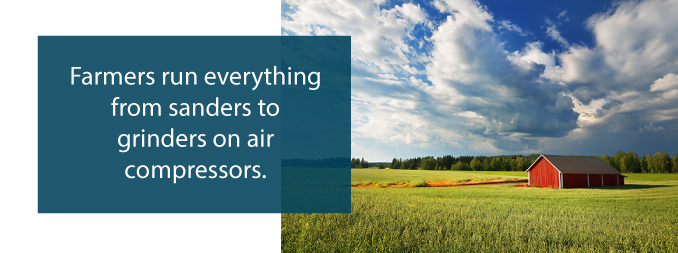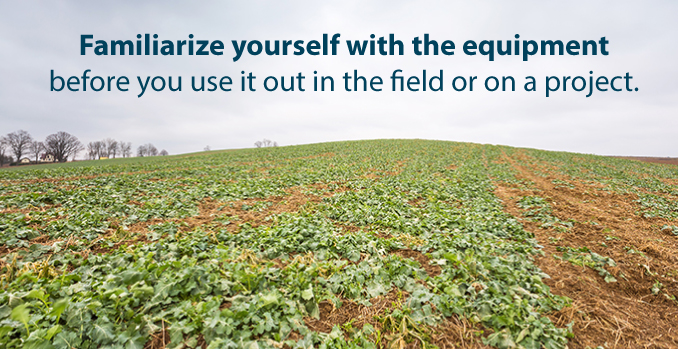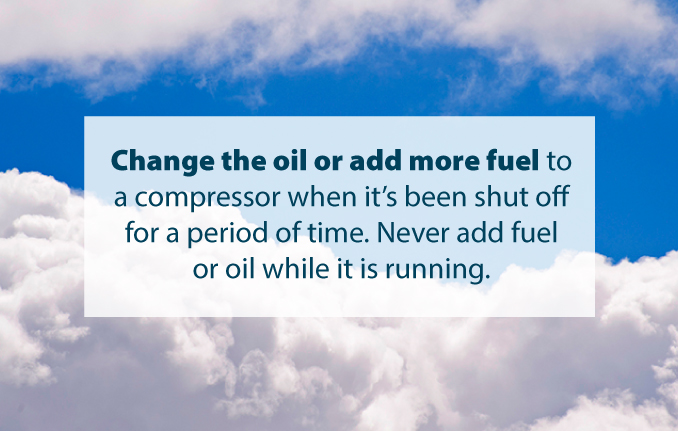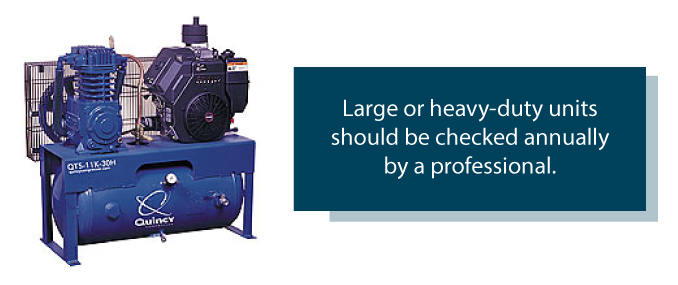Table of Contents
Nearly everyone is familiar with the air compressor at your local garage or gas station. Compressed air is used to inflate vehicle and bicycle tires. Without it, we probably wouldn’t have the transportation system that we have today.
Air compressors, however, have a much wider range of use than simply inflating vehicle tires. Air compressors are used throughout the nation in numerous industries, including agriculture. On the farm, an air compressor is a valuable tool just like a fence post digger or an all-terrain vehicle. A farmer’s air compressor can be used for a wide range of tasks.
Farmers today even continue to find new and innovative uses for air compressors. If there’s a job to be made easier or less expensive, you can count on a farmer to find a way to do it!
It’s not just the large-scale agricultural corporations running air compressors these days. Homesteaders, backyard farmers and anyone interested in raising crops or livestock will find that an air compressor can make their chores easier.
What Exactly Is an Air Compressor?
An air compressor is a power tool that creates and moves pressurized air. Air under pressure provides great force, which can be used to power many different kinds of tools.
Reciprocating air compressors work by means of a piston and cylinder. When the machine is switched on, pressure changes suck air into the tank. The trapped air in the tank is placed under great pressure when the pistons move down. It is released by a discharge valve into another tank, where its release can be regulated and controlled through a valve. The valve discharges the pressurized air into another tool or into a space such as a bicycle tire, where it inflates the tire and holds the tire’s shape as long as air can’t escape back into the atmosphere.
Pressurized air is measured in cubic feet, and the flow rate is measured in cubic feet per minute (CFM). The pressure itself is measured in units called PSI, or pounds per square inch. A typical pressure rating for a home or small farm use air compressor is 90 PSI. By comparison, spray guns for painting use about 40 PSI.
A typical air compressor runs by electrical power. Smaller home air compressors are fine for simple jobs, but medium or heavy-duty compressors may be needed for larger farm or construction projects. These compressors are lubricated with oil, which makes them run cooler and more quietly than without.
Air compressors have a gauge that indicates you when the compressor reaches the desired PSI. Many have settings to help you control the PSI so you can dial it up on the gauge, turn the compressor on and wait for the machine to obtain the desired pressure for the job.
Contact Us Learn More Find a Dealer Near You
Energy Sources for Farm Use Air Compressors
Smaller air compressors use electrical power. These compressors plug into a standard outlet using a two-prong plug.
Medium and larger air compressors may require a three-prong plug. Some heavy-duty units may need a 230-volt unit compared to the standard 115-volt unit you’ll find in the average home, barn or garage. Check the air compressor’s instruction manual to determine which power source you need.
If you need to move up to a 230-volt circuit, call a professional electrician to install it in the area where you think you’ll need the air compressor the most, such as your barn or machine shop.
Some farm chores can’t be completed inside of a building. You may need to run your air compressor on the go. For those times when you need a portable air compressor, consider finding one that can be run on gas power, like a generator. These compressors can be placed onto the back of a pickup truck and moved to locations around your farm.
Another option to extending the reach of your air compressor is adding a longer air hose to the unit. This extends the reach without using an extension cord.
What Supplies Will I Need for My Air Compressor?
The supplies you need to run your farm’s air compressor vary with the type of compressor you buy and the uses of it on your farm. Generally, you’ll need:
- An air compressor suited to the majority of tasks you’ll perform.
- Air tools to use with the compressor, such as a nail gun, paint sprayer, etc.
- Tubing
- Extension hoses (for longer reach)
- Regulators
- Pressure gauge
- Lubricators and coolants
- Oil (for oil-lubricated units)
- Hardware to bolt larger compressors to the floor
- Safety goggles to protect your eyes during use
15 Farm Uses for Your Air Compressor
With so many uses for an air compressor on the farm, you may want to consider buying two for your farm needs. This list offers many ideas and options for anyone running a homestead or small farm. You’ll probably find more uses for your air compressor as time goes by and as you expand your farming operations into different areas of livestock or crop production, but here are some common air compressor uses on a farm:
1. Inflating vehicle tires
Most small farms own not just cars and trucks, but smaller vehicles such as all terrain vehicles. Although tires for all terrain vehicles are extremely durable, you’ll still need to inflate them to the proper PSI for safety. Having your own air compressor on hand makes it much easier and faster to keep your tires inflated. You can keep all of your farm trucks and vehicles in good working order when the tires are inflated to the correct PSI.
2. Trailer tires
Anyone who owns livestock tends to own a stock trailer, too. These trailers are essential for transporting livestock to market, bringing home new animals or moving animals long distances. A stock trailer is also important to bring sick animals into your veterinarian if your local vet cannot make a farm call. Keeping the tires inflated on your stock trailer means you’ll always be ready for an emergency trip or for any trip. Many farmers have found that having their trailers ready can mean the difference between saving stock or losing it. You never know when you’ll need that trailer.
3. Pneumatic nail guns
Farmers tend to be “do it yourself” types. Many build their own outbuildings, chicken coops, run-in sheds, machine shops and the like. A pneumatic nail guns makes it so much easier to build structures quickly. Pneumatic nail guns rely upon pressurized air to shoot nails into materials with great force. Framing, finishing and many other types of pneumatic nail guns can be used with a common air compressor for farm jobs.
Whether you are building a new stall door to replace one your horse kicked in or adding a new chicken coop to the farm, a nail gun run from your air compressor makes the task quick and simple. Most pneumatic guns can be used with smaller air compressors, but check the manual for your nail gun to make sure it is compatible with the air pressure available from your compressor.
4. Pneumatic staplers
Like a pneumatic air gun, pneumatic staple guns run on air compressors also make many farm chores easy. If you’ve ever run wire mesh fence from one post to another, you know adding heavy-duty staples to hold the fencing in place can be tiring on your hands and a lot of work.
A pneumatic staple gun running from your air compressor can make the task a lot less tiresome. Pneumatic staplers can also be used to affix roofing paper and shingles to outbuildings, barns and sheds. They can also be used to repair upholstery on farm vehicles such as trucks by running a pneumatic stapler attached to an air compressor to staple vinyl in place over seats.
5. Painting
Sure, you can paint your home, garage, shed, barn and outbuildings the old-fashioned way with a brush or roller. But a spray painting gun affixed to your air compressor makes the job so much faster. Spray guns provide an even flow of paint that coats the wood without drips or messes. The paint droplets form a smooth coat over most surfaces.
They can also significantly cut down the time it takes to paint the average building, another plus for the busy farmer or homeowner. If you’ve ever had to paint acres and acres of post and rail fence, you know that a paint gun can really come in handy to move the job along.
6. Cleaning equipment
Compressed air can be used for cleaning equipment, but OSHA warns that it should never be used to clean clothing or skin. It’s recommended that you first try to clean equipment with brushes or other manual equipment first, and only use compressed air when all else fails.
Use compressed air in a well-ventilated place and always wear protective goggles and clothing. Blow the air away from you, and make sure the air hose is secure to prevent it from whipping around and accidently hurting someone. Truck tires, stock trailers and other heavy-duty equipment can be cleaned using low settings of compressed air.
7. Weeding
Farmers are truly an innovative bunch. One Minnesota apricot farmer has been experimenting with using ground up apricot pits forced under air pressure onto weeds to kill them. Ground up stone fruit pits, walnut shells or other natural items make a powder that when forced under high pressure can strip weeds from a field.
Other gritty substances that are being tested include corn gluten meal, which is a natural weed killer often used on organic farms. By spraying the meal out under high pressure, the weeds are destroyed while the soil is fed. The researchers who invented this unique use of compressed air on a farm are still working with different crops and materials to see which works best for weeding. While this technique is still under development, it just shows that air pressure can be used for many things beyond powering tools on a farm.
8. Dairy farms
Air compressor farm uses include dairy farms. Dairy farming is one of the most labor-intensive farming operations, and anyone who owns dairy cows, goats or sheep will attest that it can be back-breaking labor. Newer devices using air compressors can power milking machines, such as the milker claw detachment unit.
Air compressors are also being used to power flush systems that wash animal waste from the milking parlor to keep it clean and sanitary. Compressed air can also be used with milking systems to create the vacuum suction on the milking machine itself, which draws milk from the cows into a holding tank for further processing. All of these inventions using air compressors mean a little less work for the hard-working dairy farmer and the ability to work with more cows, which can increase productivity and profits on the farm.
9. Air Powered Gates
Pneumatic powered gates and chutes are now being used on dairy farms alongside air compressor-run milking machines. These automatic gates send the cows in at regular intervals for milking and help control the herd. Instead of having one person at each gate, the automatic pressure opens and closes gates for you. Parlor stall entry and exit gates, movable panels to separate cows and other types of gates, panels and portable chutes can be used with air compressors to more efficiently move and hold cows during the milking process or during routine vaccinations and other times of the year.
10. Orchard Use
Orchards rely upon extensive spraying at specific times of fruit tree growth and development to control a wide range of diseases and insect pests. Air compressors running sprayers are a boom for the orchard industry. With an air compressor and a professional spraying unit, you can reach the tops of trees more easily and spray your orchard in a fraction of the time it takes with manual sprayers.
Air compressors used in the orchard industry are often mounted on the backs of pickup trucks or trailers drawn by farm vehicles. An operator runs the vehicle while another, wearing protective gear, stands on the back of the truck and manipulates the spray hose to reach the trees’ branches. Agricultural spraying using air compressors can also be used to spray a wide range of insecticides, fungicides and fertilizers and row crops.
11. Aquaculture
Aquaculture means the raising of fish for consumer use. Aquafarming techniques use stocked ponds or other stocked fish farming systems to raise hundreds of commercially farmed catfish, tilapia, carp, bass and trout. Even homesteaders or backyard farmers can raise fish. Many farmers turn old swimming pools into aquaculture systems.
Fish raised in backyard ponds or aquaculture systems need clean, circulating water with plenty of oxygen to keep the fish healthy. An air compressor can be used to run filtration systems or oxygenators that bubble air through the water. Compressor air systems used on fish farms blow air through air stones placed along the pond’s bottom. These aerate the water from bottom up, bubbling the water to prevent algae growth and to add oxygen to the water.
According to Fish Farm Supply, air compressor systems are better for fish health because they allow for more air penetration into the water. The size of the compressor will depend heavily on the size of the aquaculture project, but even a small compressor can bubble fresh air through a closed water system and improve fish health.
12. Septic systems
A new machine featured on Farm Show called the Soil Shaker blows compressed air through closed septic systems to open up the pipes again. Many agricultural septic systems close prematurely due to clay or other silt caught in the drainage field system. The Soil Shaker simply uses air to force the particles back out of the system so the septic drainage field can work properly again. By fixing the field instead of replacing it, the Soil Shaker saves farmers and rural homeowners a great deal of money and trouble.
13. Powering water pumps
A new type of well water pump called the Brumby Pump uses compressed air to raise water to the surface level. According to the company’s website, almost any air compressor can be used with the Brumby Pump. Also called the “air lift method,” the process relies on the fact that air is lighter than water and will push the water up to the surface.
It’s useful for farmers who want an alternative to electrically-driven pumps which can fail during storms or major power outages. The air compressor can be run on a generator, and stock tanks can be kept filled. Farms, ranches and homes in storm-prone areas may wish to investigate this ingenious water pumping system.
14. Cleaning production areas
Many large-scale producers of root vegetables such as carrots are using compressed air systems to clean their processing areas. Grimmway Farms, a large-scale producer of carrots, implemented a new high-efficiency air compressor-based system to clean its packaging area. The result was better energy usage and greater cost efficiency.
While small-scale farmers may not be able to implement the same system, it points to another use of air compressors for agriculture that may eventually be scaled down to the homesteader or backyard farmer. Other farmers use compressed air to clean barnyard areas where manure, bedding and other debris can build up.
15. Wind energy storage
Renewable energy is one of the most exciting concepts on the horizon for most homeowners, farmers and ranchers. Wind energy is clean, efficient and free once the equipment is put into place. But the wind doesn’t blow all the time, so you can’t rely on it to power things you need long-term. Enter air compressors! The Iowa Association of Municipal Utilities is experimenting with a wind-powered, air compressor battery that will store energy from the wind in underground compressed air tanks. It sounds like something out of science fiction, but it seems to work.
Wind turbines running during off-peak energy times pump compressed air into underground aquifers, where it can later be released to power the turbine during peak times. In Germany, a similar method using underground salt caves has been patented. The hope is that wind turbines can power the air compressor batteries that will continue to turn the turbines during-off peak hours, smoothing out the energy produced so it can be as regular as coal or oil-powered electrical plants.
Critics contend that the Iowa plan can actually harm underground water reserves, potentially drying up local well if the aquifer is tampered with, but the overall concept of using compressed air for energy holds great promise for the clean energy movement. On farms, a similar use may be implemented with wind turbines used to generate additional energy. Smaller-scale battery storage using compressed air could potentially keep wind-generated electricity flowing onto the farm, too.
There are many other air compressor farm uses. Farmers run everything from sanders to grinders on air compressors. Chisels, awls, pumps, shears — almost any farm tool can be powered with an air compressor.
“Amish Electricity” and the Uses of Compressed Air on Farms
One of the more fascinating air compressor uses on a farm comes from an unlikely source — the Amish. Many people know the Amish from television, movies and books as the ‘plain people’ who eschew modern conveniences, ride in buggies and live separately from the modern world.
Amish people do not rely upon electricity, fearing that it will make them too dependent on external forces and harm their unity. That doesn’t mean they won’t adapt modern inventions to their own purposes.
Many Amish families run gasoline-powered generators, gasoline-powered lawn mowers and washing machines as well as propane-powered refrigerators, washing machines and heating units for their homes. Each community acts under the guidance of their local bishops who set the standard for the size of the generator or the type of power that can be used. Some communities allow solar power but not gasoline power. Others allow gasoline power but only engines of a certain size.
Several of the air compressor uses on a farm listed above actually originated with Amish farmers. Amish women have been quite clever at adapting compressed air for kitchen use, running blenders and mixers!
It just goes to show you the power and adaptability of air compressors. If there’s a farm chore that can be done easier with compressed air, someone will invent it!
Air Compressor Safety
Air compressor safety recommendations should be reviewed by anyone new to using an air compressor. Sure, air doesn’t sound scary, but air run under high pressure through an air compressor can drive nails through sheetrock. Anything that strong should be taken seriously.
When you’re looking at how to use an air compressor on the farm, take into account these safety tips:
- Familiarize yourself with the equipment before you use it out in the field or on a project. Read the owner’s manual. Learn the parts of the machine. Make note of any safety features such as shut-off valves or kill switches to quickly shut the equipment off in the event of an emergency.
- Do not allow children to use the air compressor or handle the hoses. Supervise children and small animals around air compressors, or better still, use it in an area that’s off limits to them.
- Never use an air compressor to clean clothing, skin or animals. Compressed air can actually drive debris and air particle into the skin or mucous membranes, causing injury or death.
- Use your air compressor outside or in a well-ventilated area. The intake air can contain carbon monoxide and other fumes that are toxic. Don’t breathe in fumes from your compressor.
- Don’t use air compressors intended for indoor use only outside. Like all other electrical appliances, air compressors are rates for use indoors or outdoors. Using indoor equipment outside can lead to electrical shocks, electrocution or premature equipment failure.
- Watch out for rust. Rusty tanks are more likely to explode. Get a new air compressor if you see signs of rust developing on the tank! Drain tanks daily or use a finer drain to ensure safe operation.
- Never bypass the relief valves or try to alter them in any way. They’re on your equipment for a reason, and they protect you from pressure build up.
- Change the oil or add more fuel to a compressor when it’s been shut off for a period of time. Never add fuel or oil while it is running.
- Turn off any tools connected to the air compressor before turning on the compressor itself.
- Only plug your air compressor into outlets with the correct voltage for the machine. Running a compressor on the wrong circuit can blow the circuit, the compressor or both.
- Bolt big air compressors down onto machine or workshop floors. This keeps them from moving during use. Vibrations can “walk” machines across some floors, leading to accidents.
- Wear safety goggles and other safety equipment when using your air compressor to protect your eyes.
- Don’t use your air compressor when you’re tired or distracted. Power tools can be dangerous when you aren’t paying attention. Farmers often work in dangerous situations or with large, powerful tools. Distraction can lead to injury.
Air compressors are a great tool to have on the farm. They power many useful, time-saving tools. By taking a few simple safety precautions, you can prevent accidents with your air compressor that can harm you, your family or your livestock.
Maintenance for Air Compressors
Air compressors need routine maintenance the same as many other pieces of farm equipment need maintenance. Check the user’s manual for the specific maintenance steps for your unit. Not all air compressors require the same maintenance.
Many air compressors need the following routine maintenance steps:
- Drain the air receiver: Water can collect at the bottom of the air receiver. It needs to be drained to prevent rust, mineral buildup and other problems. The air receiver should be drained yearly or more often in humid climates.
- Check plugs and electrical cords for wear: You’re likely to use your air compressor outdoors where electrical plugs and cords may come into contact with the ground. Check to make sure the plug is tight and clean and that cords are free from cracks, tears or breaks. Repair or replace if the cord is damaged. Damaged cords can be an electrocution hazard or a fire risk on a farm.
- Lubrication check: Check to make sure the lubricant in your air compressor is at an optimal level, if a lubricant is used. Add more as necessary. If the system seems to be losing lubricant faster than normal, have the equipment checked by a professional. It may be running hotter than it should or there may be a small leak or crack.
- Filter change: Air intake filters may need to be changed. A clogged filter harms the unit by making the motor run harder than it should to maintain the system pressure.
Large or heavy-duty units should be checked annually by a professional. Valve plates, gaskets and other parts should be examined and replaced if necessary. It’s a good idea to ask at the place where you buy your compressor if they have a service department. If not, they may be able to recommend a local repair shop that can fix or inspect your machine.
Choosing an Air Compressor
When it comes time to choose an air compressor for farm uses, the choices can seem overwhelming at first. As with all machinery, consider first your primary uses for an air compressor on your farm. Will you need one for construction projects around the farm, painting or simply filling vehicle tires?
Make a list of all the potential uses for your air compressor. Then go down the list and analyze the majority of uses to see if a specific type of compressor will cover most uses. Some rural areas have machine shops where you can rent equipment. You may wish to buy a good air compressor for farm use and rent one if you need a specialized compressor for a single-use project, like building a new barn.
As your farm operation or homestead grows, you can easily add equipment. By starting with the basics that can tackle the majority of jobs, you’ll invest your money wisely into durable air compressors that can make your chores easier.
Quincy Agricultural Air Compressors are up to the challenge for most farm or agricultural jobs. These reliable, trustworthy air compressors are made to last. They are available in a range of sizes so you can find the right air compressor for the majority of farm tasks you plan to tackle.
Three Quincy Air Compressor models are great for farming and agricultural applications:
- Quincy QT: The Quincy QT air compressor offers an affordable, reliable standard-duty two stage air compressor. With four horsepower levels to choose from, you’re sure to find one that fits your farm’s needs. Features of the Quincy QT air compressor include a cast iron crankcase and cylinders, high efficiency intercoolers, industrial class bearings and loadless auto start and stop functions.
- Quincy QP: Step up your game and power more with the Quincy QP series of air compressors. These heavy-duty models can tackle your toughest agricultural tasks with ease. The Quincy QP series features an oil pump for pressurized lubrication, which allows for smoother operation. This series of air compressors includes cast iron crankcase, cylinder and flywheel, high-efficiency intercooler and positive displacement oil pump. Automotive style inlets, filters and silencers plus an oil filter and pressure gauge make it easy to learn and operate. The Quincy QP air compressor can handle up to 175 PSI applications with ease.
- Quincy QR-25: The Quincy QR-25 is one of our most popular air compressors. Introduced in 1939, this time-tested model can handle some of the heaviest work on your farm. Rebuildable components and sturdy construction make the QR-25 last for years. It’s one of our most cost-effective models, offering you excellent value for your investment.
Everything about this unit was designed with the user in mind. Even the valves are easy to change. We’ve made sure they can be easily accessed so the average farmer can change them at home. Heavy-duty cast iron construction makes this the workhorse of your equipment stable. With nine models to choose from, you’re sure to find one that suits your needs perfectly.
Should You Buy a Used Air Compressor?
Although some farm and garden shows recommend looking for a used air compressor on eBay, Craigslist or at auction, there are some risks of buying used equipment:
- Used air compressors may be at the end of their usefulness. It’s hard to tell just by examining a machine how many running hours it has left in its life. Because used compressors aren’t under warranty, you could spend good money on a used compressor and have it fail right after you buy it during a critical task.
- Parts may no longer be available. Older models of compressors may no longer be serviced, or replacement parts may no longer be available. You may not know this until something breaks and you learn the hard way that your air compressor can’t be fixed. When you buy a new compressor, you should be able to easily find parts for maintenance or simple repairs.
- Older compressors may not be suited to modern equipment. Some really old air compressors may not provide enough pressure to run modern equipment. Again, you may not realize this until you bring the unit home, hook it up and find it’s not what you needed.
There’s an old expression, “Penny wise and pound foolish.” When it comes to investing in an air compressor, don’t be penny wise and pound foolish. Investing in new machine such as Quincy Agricultural Air Compressors for farm use gives you peace of mind. Not only will you have new equipment that’s suited to the task, but you’ll invest in a brand with an excellent reputation for longevity, quality, reliability and durability.
To find a Quincy Compressor dealer near you, visit our sales and service locator today.


